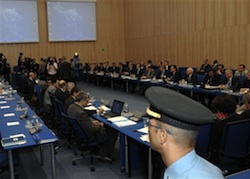Early Stages of Talks with Iran
October 20, 2009
Featured Image
Nuclear Swap - Washington Post Editorial [link]
- Administration officials rightly describe the uranium deal as a quick and clear test of Iran's intentions.
- If the export takes place by the end of this year -- the time frame fixed by the United States and its allies for progress in the nuclear negotiations -- the politically beleaguered regime of Ayatollah Ali Khamenei will have demonstrated, at least, that it wants to lower tensions with the West and delay a full confrontation over its nuclear program.
- By proposing the uranium swap, the Obama administration may have found a way to buy some time and avoid an impasse in which it would have few options. Let's hope it works.
Iran Talks Stalled Over French Role, Diplomats Say - Associated Press [link]
- Talks meant to persuade Iran to send most of its enriched uranium abroad -- and thus delay its potential to make a nuclear weapon -- bogged down Tuesday over fierce Iranian resistance to French participation, diplomats said.
- Tuesday was the second day of talks in the Austrian capital between Iran and the United States, Russia and France over Iran's nuclear program.
Obama's Secret Iran Talks: Setting the Stage for a Deal? - TIME [link]
- Obama personally weighed in three times during secret, multiparty negotiations with the Iranians over the last four months — in what has become not just a test of Iran's nuclear intentions but also a test of Obama's effort to limit Iran's nuclear ambitions through a combination of sanctions, threats and incentives.
- In early July, Obama traveled to Moscow, where his top nonproliferation aide, Gary Samore, floated a proposal to the Russians: If Iran would agree to export a supply of LEU to Moscow, the Russians could enrich it to the level needed to power the research reactor, and then the French, who had been brought into the discussions, could turn it into the specialized plates that are used to produce the isotopes.
- What followed was a careful set of high-level negotiations between Iran, the IAEA, Russia, France and the U.S. to iron out details.
- But both sides have reasons to seek progress: if the deal were to go forward, the U.S. would have succeeded in securing most of Iran's existing stockpile against weaponization. Iran, for its part, could see the deal as legitimizing their enrichment of uranium in violation of U.N. demands.
Lowering the Alert Levels in U.S. and Russia - Walter Pincus of the Washington Post [link]
- The high alert levels for U.S. and Russian strategic nuclear forces are more political statements carried over from the Cold War than military necessities for the 21st century, according to a multinational study released last week.
- The two nations "could examine how measures to reduce operational readiness can accompany the bilateral arms control process" as part of the current negotiations over renewal of the Strategic Arms Limitation Treaty, according to the study by the EastWest Institute, a nonprofit think tank. [Note: The EastWest Institute is a Ploughshares Fund grantee]
- The study says political leadership in Washington and Moscow must take the lead on the issue, since the countries' military organizations that maintain the weapons cannot be expected to change institutionalized security objectives and operational principles on their own.
- Read the full study, "Reframing Nuclear De-Alert: Decreasing the Operational Readiness of U.S. and Russian Nuclear Arsenals," on the EastWest Institute website.
Clinton to Give Nuclear, Iraq Addresses - Laura Rozen in Politico [link]
- In the nukes speech Wednesday, Clinton "will discuss the urgency and priority of the nonproliferation and arms control agenda," an advisor says.
- "She will outline a diplomatic blueprint for implementing the vision the President set forth in Prague. She will describe the specific steps the United States intends to take and call on other states to do their part as well. Among other things, she will set forth an approach to: thwarting the nuclear ambitions of Iran and North Korea; creating a stronger IAEA with more tools to go after violators; impeding sensitive nuclear trade; and securing loose nuclear materials."
- She will also offer a robust case for swift ratification of the post-START agreement and the CTBT, he said.
Japan's Empress Appeals for Nuke-Free World - AFP [link]
- Japan's Empress Michiko on her 75th birthday issued a call for the abolition of atomic weapons and praised US President Barack Obama's push for a nuclear-free world.
- "The horrors of nuclear weapons are not only the magnitude of their destruction but also the serious and tragic effects of radiation that leaves victims suffering long" after their exposure, she said.
A View from the Dark Side
Gov. Romney Slams Obama's Iran Stance - The Hill [link]
- In a speech to the American Israel Public Affairs Committee in San Diego, Romney called the Iranian government the world's "greatest immediate threat," an "unalloyed evil, run by people who are at once ruthless and fanatical."
- "Stop thinking that a charm offensive will talk the Iranians out of their pursuit of nuclear weapons. It will not," Romney said, referring obliquely to Obama's insistence on talks with the rogue nation. "And agreements, unenforceable and unverifiable, will have no greater impact here than they did in North Korea."
- Romney called for "comprehensive, withering sanctions," along with American support for anti-government activists in Iran. Taking a hawkish line, Romney said military options should remain on the table even as Iran participates in nuclear talks with the U.S., Russia and France this week in Vienna.
- Click here for a link to Governor Romney's remarks, courtesy of RealClearPolitics.



